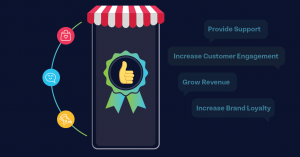
2017 Google i/o
The annual Google I/O developer conference has come to an end. Between all the parties, the conference was packed with plenty of defining announcements. It's news about technology trends that will affect the way developers and consumers interact with Google products every day. So, it’s worth taking a look at some of the higher-profile announcements, including a boost for Google’s rich communication services (RCS).
Some interesting Google tidbits
Google CEO Sundar Pichai was obviously present at the Shoreline Amphitheater in California. He gave a brief rundown on how Google has got on over the past 12 months and where the next 18 months of technology trends will take us. He proudly declared that Google’s products have more than one billion active users; 1.2 billion photos were uploaded every day using Google Photos; one billion miles were navigated using Google Maps every day; Android now has over 2 billion active devices; YouTube viewers consume over 1 billion hours of video each day. By all accounts, Google’s doing just fine.
Google Lens becomes a thing
Pichai then went on to announce what might be one of the most exciting prospects, Google Lens. “It’s a set of vision based computing capabilities, that can understand what you’re looking at,” explained Pichai. For example, you can point your phone at a restaurant. Using location data, the Google Lens will provide you with key information like reviews and the menu. Or if you come across a flower or animal that you’re unsure of, just point your camera at it and let Google Lens tell you what it is. The technology will be shipped to Google Assistant late in 2017.
Google Assistant gets a makeover
The AI-based Google Assistant is currently active on over 100 million devices. And Google’s made a few poignant changes. It’s more conversational, more available, and more eager to help. It has also become better at interacting with multiple people and will be pushed to Apple devices soon. Users can now also type to their Google Assistant if they wish. Google hopes that this increases levels of privacy.
Google Home gets launched into new territory
Technology trends are moving in the direction of AI-based home assistance. Following its launch in the UK, Google confirmed that Google Home will be launching in Canada, Australia, France, Germany, and Japan. Since launching, Google has added over 50 new features. Proactive assistance is one such example and notifies you of upcoming events, traffic delays or a change in the status of your flight.
Users can now also enjoy hands-free calling, a service that’s already offered by Amazon Echo, and will be able to call any landline or mobile number in the US for free. The device will personalize the call, meaning ‘Call my mum,’ will ring different numbers according to whose voice has been recognized. Google Assistant is also already more popular than any of its competitors.
Spotify will also be adding their free music service to the device. Users can also expect the likes of SoundCloud and Deezer on their Google Home devices soon. This extra functionality just makes the device that much more desirable.
Android Messages gets a boost
Google. Loves. Messaging. Apps. Google Hangouts, Allo, Duo, and Messenger. Developers are breathing a collective sigh of relief that it didn’t announce another one as one of the upcoming technology trends. Instead, it decided to reinforce what it already has. Android Messages is Google’s response to Apple’s Messenger. The application supports rich communication services (RCS). This advanced communication technology allows you to send modern-day SMS or MMS. What does that mean? Just higher-resolution photos, read receipts, more efficient group chats, emojis, and video: all via an SMS. It’s the future of SMS and Google continues to push it into the future with its Android Messages app. Unfortunately, this service is going to be limited by the carriers who sign up for the service, so it may take a while longer to become ubiquitous.
If you’d like to learn more about other technology trends that Google touched on during the conference, a quick search online can bring up a plethora of information on it. Alternatively, you can read our article that outlines the RCS service that Google’s launched and why it matters to you.
Explore other articles
Step into the future of business messaging.
SMS and two-way channels, automation, call center integration, payments - do it all with Clickatell's Chat Commerce platform.








